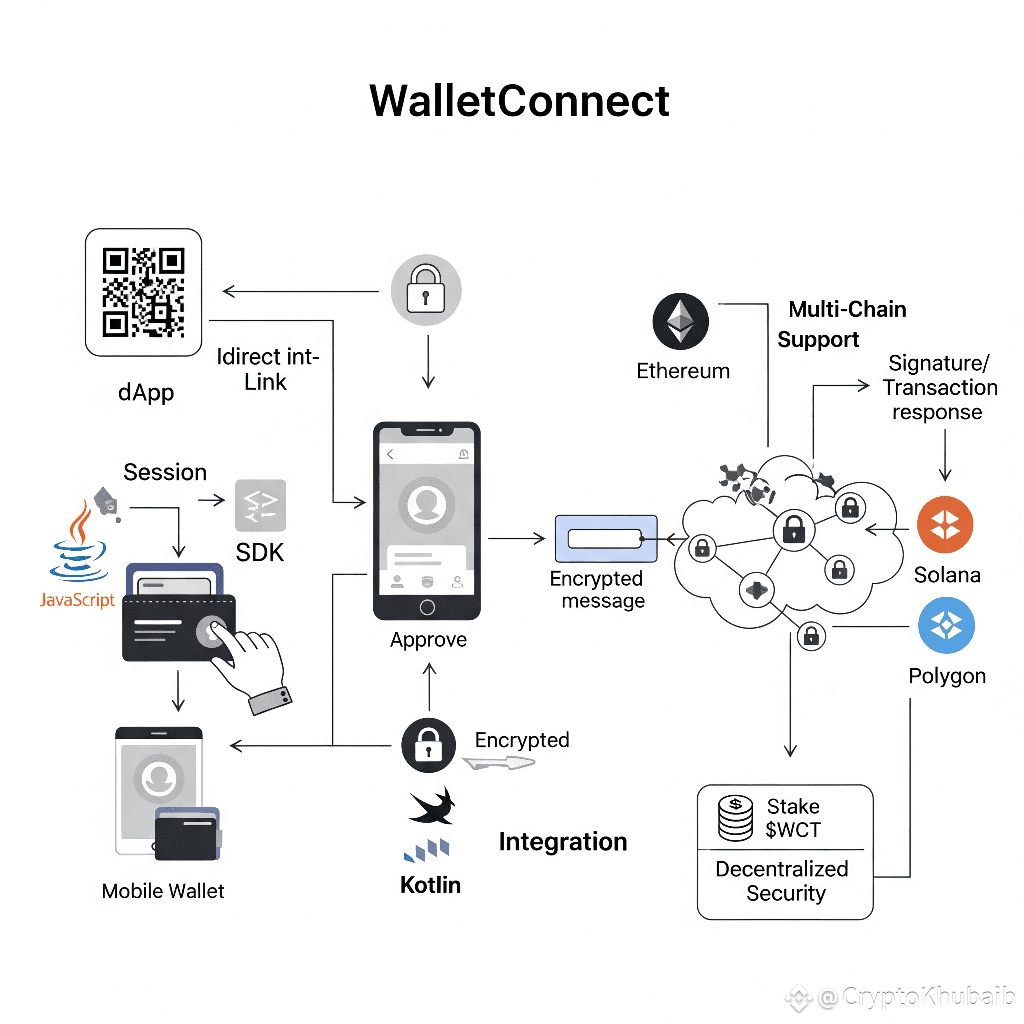🌐 What is WalletConnect?
WalletConnect is an open-source protocol that enables secure communication between wallets and decentralized applications (dApps). It acts as a secure messaging layer that connects users' self-custodial wallets (like MetaMask, Trust Wallet, Rainbow, and more) with dApps — without exposing private keys or requiring browser extensions.
Now with the introduction of WalletConnect v2 and the $WCT token, it’s rapidly evolving into a multi-chain connectivity and session layer for the entire Web3 ecosystem.
⚙️ How WalletConnect Works
WalletConnect facilitates encrypted, session-based communication between a wallet and an application using relayer infrastructure and cryptographic keys. Here's a breakdown of its core architecture:
1. 🔑 Pairing & Session Establishment
Wallet and dApp exchange keys via QR code or deep link
A secure WebSocket connection is established using topic-based communication
2. 🔄 Sign Requests & Transactions
The dApp sends transaction or signature requests via WalletConnect protocol
The wallet prompts the user to approve or reject the request securely
3. 📡 Relayer Network
WalletConnect v2 introduces a Decentralized Relayer Network to handle message delivery using topic-based pub-sub architecture
Supports multi-chain requests and persistent sessions
4. 🔄 Multi-Chain Support
dApps can request actions across EVM and non-EVM chains in a single session
Enables seamless DeFi, staking, or DAO governance across blockchains
5. 🧩 WalletConnect SDKs
Available in TypeScript, Kotlin, Swift, and Unity for broad platform integration
Easy integration into mobile dApps, web apps, and games
🧰 Developer Use Cases
WalletConnect unlocks powerful possibilities for developers and dApp builders:
1. Cross-Platform dApps
Connect mobile wallets to browser-based or desktop dApps using QR scan or deep link.
2. GameFi & Unity Integrations
Use WalletConnect’s Unity SDK to onboard players with secure wallet login and asset signing.
3. Multi-chain DAOs
Enable seamless governance participation from mobile wallets across L1s and L2s.
4. Token Gating
Verify token/NFT ownership without exposing wallet content using signed payloads.
5. Decentralized Identity (DID)
WalletConnect can integrate with identity standards to enable secure logins and proofs.
💰 $WCT: The WalletConnect Token
The $WCT token is designed to incentivize and govern the WalletConnect ecosystem.
1. Utility:
Staking for Relayer Participation
Nodes stake $WCT to run relayers and facilitate secure communications.
2. Protocol Governance
Token holders can vote on protocol upgrades and feature priorities.
3. Ecosystem Incentives
Developers, integrators, and contributors may receive $WCT for valuable contributions.
5. Supply
$WCT is capped with a defined emission schedule to ensure long-term sustainability and decentralization.
🔐 Security & Privacy
WalletConnect prioritizes user safety through:
1. 🔒 No Key Exposure
Private keys never leave the wallet device.
2. 📡 Encrypted Channels
All messages are AES256 + HMAC encrypted.
3. 🛡️ Permissioned Session Management
Wallets can reject or revoke sessions at any time.
🚀 WalletConnect’s Growing Ecosystem
WalletConnect has become the standard connectivity layer for many major projects:
Supported by Uniswap, Aave, OpenSea, Zapper, Snapshot, Aragon
Integrated in wallets like Rainbow, Trust Wallet, Ledger Live, Zerion, MetaMask Mobile
Used by gaming and metaverse dApps with Unity support
As Web3 scales to billions of users, secure and decentralized wallet connectivity becomes mission-critical — and WalletConnect leads the way.
With @undefined and $WCT, developers get a future-proof way to connect, sign, and transact — across chains, platforms, and devices — all while staying true to Web3 values.
@WalletConnect | #WalletConnect | $WCT

